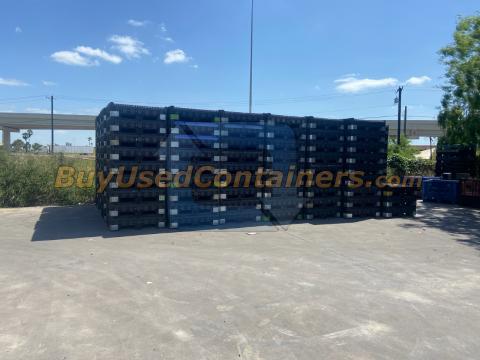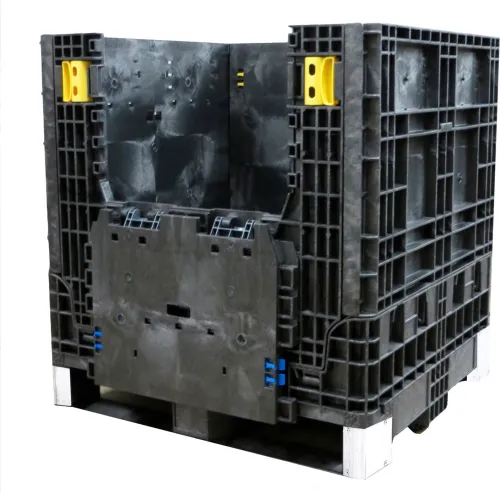How refurbished bulk containers and used bulk containers support green business practices
Wiki Article
Why Bulk Containers Are Necessary for Lasting and Affordable Transportation
Mass containers play a vital function in modern-day logistics. They help with the effective movement of large amounts of products, consequently enhancing transport procedures. This approach not just lowers expenses yet also minimizes environmental effect through lower discharges and waste generation. As markets seek more sustainable practices, the adoption of mass containers is ending up being significantly considerable. What implications does this change hold for future logistics and supply chain administration?
The Advantages of Making Use Of Bulk Containers in Logistics
Bulk containers transform logistics by enhancing efficiency and sustainability. These containers permit for the transportation of large quantities of items in a single trip, markedly decreasing the variety of journeys needed. This not only simplifies procedures however additionally decreases labor expenses associated with handling, loading, and discharging. Additionally, bulk containers are created to maximize area use within transportation lorries, making certain that more products can be shipped all at once.The standardization of mass containers additionally simplifies the logistics process. With uniform dimensions, they can be easily stacked and saved, leading to improved storage facility monitoring. In addition, bulk containers often include durable materials that protect components from damages during transit, therefore reducing item loss and increasing overall dependability. Therefore, services can experience boosted supply chain efficiency, ultimately causing boosted earnings and customer complete satisfaction. This combination of aspects makes mass containers an essential asset in modern logistics.
Ecological Effect: Minimizing Waste and Carbon Footprint
As sectors progressively focus on sustainability, the adoption of mass containers has become a crucial technique for minimizing waste and reducing carbon footprints. These containers lessen the use of packaging materials, such as boxes and plastic, therefore significantly reducing general waste generation. By settling deliveries, mass containers improve transport performance, enabling more products to be transferred per trip. This reduction in journeys directly correlates with lower greenhouse gas emissions, adding to a smaller carbon footprint.Bulk containers can usually be reused or reused, better alleviating ecological effect. The longevity of these containers assurances they can stand up to multiple transport cycles, lowering the demand for single-use choices. used collapsible bulk containers. By simplifying logistics and promoting effective source use, bulk containers not only sustain sustainable practices but likewise urge sectors to straighten with international ecological objectives. Eventually, their application shows a dedication to ecological stewardship and responsible source monitoring
Expense Savings: How Bulk Containers Lower Transportation Expenditures
While lots of companies seek methods to enhance their profits, making use of mass containers presents a substantial possibility for decreasing transport expenses. Mass containers make best use of the quantity of products delivered, allowing organizations to deliver bigger quantities at as soon as. This effectiveness reduces the number of journeys needed, straight lowering gas costs and decreasing labor costs related to loading and discharging.In addition, bulk containers typically feature structured layouts that enhance room application within transportation lorries. This suggests fewer voids, bring about a lot more reliable use available capability. The resilience of mass containers can reduce the danger of product damage throughout transit, reducing losses and guaranteeing that even more goods show up undamaged.
Enhancing Supply Chain Efficiency With Mass Storage Solutions
Bulk storage space options play a vital function in improving supply chain effectiveness by enhancing supply administration. By combining goods right into less, bigger containers, organizations can greatly lower taking care of costs connected with regular transfers and handling. This streamlined technique enables far better tracking and administration of stock, eventually causing enhanced operational efficiency.Structured Stock Administration
Efficient supply monitoring is necessary for maximizing supply chain operations, particularly when organizations embrace bulk storage remedies. These remedies enable services to preserve higher stock levels while decreasing the frequency of replenishment. By settling products into mass containers, firms can streamline their inventory processes, reducing the intricacy connected with tracking multiple smaller bundles. This approach facilitates accurate supply matters and enhances projecting precision, permitting more enlightened decision-making. On top of that, bulk storage options streamline storage facility company, making it less complicated to find and access items when required. Therefore, companies can attain an extra reliable inventory turnover price, eventually enhancing overall supply chain efficiency and lowering the likelihood of stockouts or overstock scenarios.
Minimized Handling Prices
The execution of mass storage remedies not just enhances supply monitoring yet additionally considerably decreases handling costs across the supply chain. By combining products into bulk containers, companies reduce the requirement for frequent handling and transfer in between different storage space and transportation systems. This strategy lowers labor costs connected with loading, unloading, and moving smaller plans. In addition, mass storage space minimizes the regularity of shipments, leading to lower transportation prices and lowered gas consumption. Consequently, companies can optimize their logistics procedures, permitting a much more efficient appropriation of resources. Eventually, lowered dealing with expenses add to boosted total supply chain effectiveness, promoting an atmosphere that sustains both sustainability and economic feasibility.
Convenience of Mass Containers Across Different Industries
Several markets have distinct requirements for transport and storage space, bulk containers have actually emerged as a flexible remedy that satisfies a wide variety of needs. These containers, ranging from huge containers to specialized storage tanks, can accommodate diverse products, including granules, liquids, and powders. In the agricultural field, bulk containers promote the transportation of grains and plant foods, while the food and drink market utilizes them for active ingredients and completed items. The chemical market depends on bulk containers for safely transferring hazardous materials, making sure compliance with security guidelines. In addition, building and construction companies take advantage of mass containers for transporting accumulations and other products. Their flexibility includes various settings of transport, including vehicles, trains, and ships, enhancing logistical efficiency. This convenience not only enhances procedures across different markets yet also advertises sustainability by lowering product packaging waste and enhancing space in transportation. Bulk containers play an important duty in contemporary supply chain monitoring.Future Trends in Bulk Container Use and Sustainability
The future of bulk container usage is significantly formed by cutting-edge materials development that improves sustainability. In addition, automation in logistics promises to improve operations, decreasing waste and boosting effectiveness. Welcoming round economic situation techniques will certainly better revolutionize exactly how bulk containers are created, used, and reused, promoting an extra sustainable transportation landscape.Cutting-edge Materials Development
As sectors progressively focus on sustainability, cutting-edge products development wholesale containers emerges as a substantial consider enhancing green transportation services. Manufacturers and researchers are checking out naturally degradable plastics, recycled compounds, and light-weight steels to lower ecological effect. These products not just reduce waste but also boost gas efficiency by reducing the general weight of containers. In addition, developments in wise materials, which can adjust to varying conditions, enhance the durability and capability of bulk containers. The assimilation of these ingenious materials aligns with round economic situation concepts, advertising reuse and recycling. As the demand for lasting practices grows, the advancement of such materials will certainly play a crucial duty in forming the future of bulk container usage in logistics and transport.Automation in Logistics
Substantial developments in automation are positioned to change logistics and the use of bulk containers, boosting sustainability in transportation. Automated systems, including drones check it out and autonomous lorries, are simplifying the activity of mass containers, minimizing the dependence on traditional fuel-powered transport. These modern technologies maximize transmitting and packing processes, improving and decreasing empty miles gas efficiency. Furthermore, automated supply management systems enhance monitoring and monitoring of mass containers, ensuring better source appropriation and reduced waste. The combination of the Net of Things (IoT) enables real-time information analysis, enabling proactive decision-making that aligns with sustainability objectives. As automation continues to advance, it is anticipated to drive further innovations in bulk container use, eventually supporting more sustainable logistics techniques and decreasing the ecological effect of transport.Circular Economic Situation Practices
Developments in automation are establishing the stage for a much more integrated strategy to circular economy practices in the domain of bulk container usage. As sectors increasingly accept sustainability, mass containers are being developed for durability and reusability. This shift not only lessens waste however additionally improves resource effectiveness. Business are embracing techniques such as closed-loop systems, where made use of containers are accumulated, reconditioned, and reestablished into the supply chain. Furthermore, clever technologies track container life process, facilitating far better management and click over here now lowering environmental influence. The collaboration in between makers, logistics providers, and end-users is crucial in establishing criteria for lasting container usage. used bulk containers. Future trends suggest a growing focus on products that are biodegradable and recyclable, further strengthening the round economic situation's concepts wholesale transport
Often Asked Concerns
What Materials Are Mass Containers Commonly Made From?
Mass containers are commonly built from durable products such as high-density polyethylene, aluminum, steel, and cardboard. These materials offer security, strength, and flexibility, making them ideal for transferring numerous products in various markets successfully.How Do I Select the Right Size Mass Container?
Choosing the ideal size bulk container includes assessing the volume of materials to be delivered, thinking about managing devices compatibility, and evaluating storage area demands. Proper dimension warranties efficiency in transportation and decreases waste throughout shipment.Are Bulk Containers Reusable or Recyclable?
Bulk containers are usually reusable, designed for numerous journeys, enhancing sustainability. Many can also be reused, depending on the products utilized. Choosing recyclable choices even more sustains ecological goals and reduces waste in transportation methods.What Security Rules Apply to Bulk Container Transportation?
Safety and security laws for bulk container transportation consist of compliance with the Division of Transport guidelines, appropriate labeling of dangerous materials, structural honesty analyses, and adherence to weight restrictions to ensure secure handling and prevent accidents during transportation.Just How Can Companies Change to Making Use Of Bulk Containers Effectively?
Companies can change to bulk containers by examining current logistics, training staff on handling, purchasing appropriate equipment, maximizing inventory monitoring, and collaborating with suppliers to guarantee compatibility and performance throughout the supply chain.
As industries significantly focus on sustainability, the fostering of bulk containers has arised as a key method for minimizing waste and reducing carbon footprints. By combining materials right into mass containers, companies can simplify their supply procedures, lowering the complexity connected with tracking several smaller sized bundles. As industries progressively focus on sustainability, cutting-edge products development in mass containers emerges as a considerable aspect in boosting environment-friendly transport services. Automated systems, consisting of drones and self-governing automobiles, are streamlining the movement of bulk containers, reducing the dependence on conventional fuel-powered transportation. Additionally, automated inventory monitoring systems boost tracking and tracking of mass you could try this out containers, making sure much better source allotment and minimized waste.
Report this wiki page